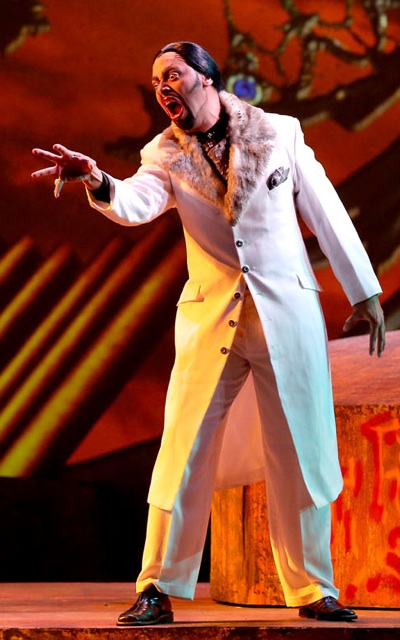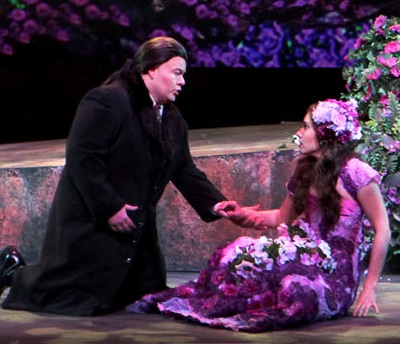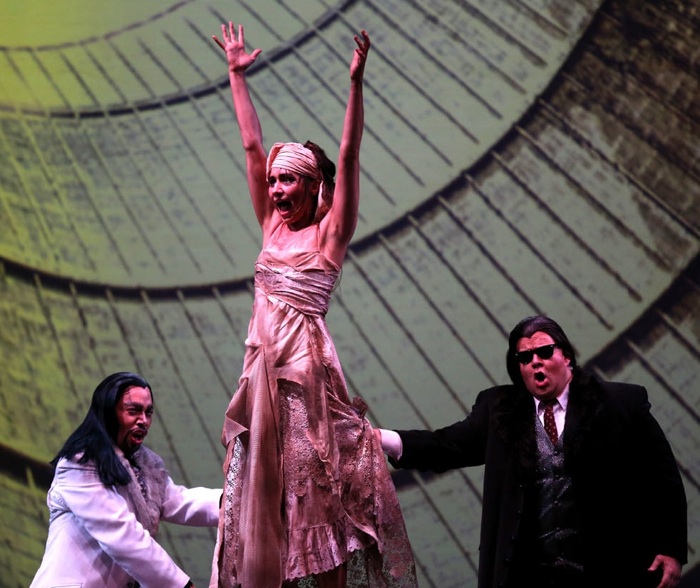
The West Bay Opera, the Western United States’ second oldest opera company, is finishing its fifty-ninth season with a hair-raising Faust. Now showing in Palo Alto’s Lucie Stern Theater, they were rock solid at their opening on Friday, May 22.
It was a perfect mating of elements: inspiration, talent, artistic integrity and much work, and demonstrated the secret of their longevity.
The excellent conducting of general director José Luis Moscovich, whose insight into Charles Gounod’s music inspired the whole – including an energetic army of volunteers – combined with the post-apocalyptic re-visioning of video artist Frédéric O. Boulay, stage director Ragnar Conde and set designer Peter Crompton for a perceptive and arresting update of a classic. And that underpinning launched an excellent cast, some of whom have already appeared on world-class stages such as the SF Opera, the Met, and the English National Opera.
In other words, it was that rare event, a delightfully intimate house with great voices and an electric concept… and bits of Mad Max!
The overture began with a big-boned burst of brass and a portentous silence. Then the strings layered in, building harmonies. The cellos were ripe and thickly stranded – and usually they get lost in the mix – and then violas melted in, followed by lush violins. Flutes took the top and they transformed from a thick fog of harmonies into sudden lyricism. This was a dream of place and a dream of love, setting the stage for the traps of earthly desires.
The Faust myth dates from the sixteenth century or earlier, with Goethe’s poetic nineteenth century interpretation as the source of Gounod’s French masterpiece. Known for his sacred music, Gounod leans heavily here on themes of sin and redemption. It can be strangely punishing, but Moscovich and his team nuanced that into a deeper look at human motives.
The action opens in a laboratory, with the elderly Faust bent on brewing one last potion to end his life, when Mephistopheles appears. And what a devil! Kevin Thompson sang that role with zest and a scary believability, a powerful bass that filled the hall and confused the senses.
His hoped-for victim, the soul-weary Faust, is portrayed by tenor James Callon with a classically clean tenor that evoked the gamut of human hopes and mistakes. He trades his soul to the Devil for eternal youth after being shown a picture of the lovely Marguerite, but his downfall came even earlier, when he chose the sciences over philosophy and theology (displaying a mid-nineteenth century aversion to questions of Faith). In this production he is a biochemist dabbling in genetics against a video backdrop of formulae and DNA double helixes. The minions of Mephistopheles, cleverly dressed in Mad Max attire with shades and desert boots, helped Callon transform from age into youth.

Marguerite, played by Elizabeth Zharoff, faces her own test. Her young suitor, Siebel, places white flowers at her favorite spot (winsomely sung by mezzo Molly Mahoney as a pants-role). But lured by the Devil’s jewelry and Faust’s insincere promises of love, she imagines herself as a princess. In the “Jewel” aria, Zharoff’s splendid soprano was full and teasing, a metaphor for the certainty and foolishness of youth. “It feels like a hand clasping my wrist,” she sang of a heavy bracelet, and already perceives that there will be a price, with vanity and wealth unlooked-for replacing the fragile beauty of a flower.
Her French added internal depths and lights with the echoing spaciousness of a cavern, and she delivered this with a honeyed vibrato. This is a voice that will be sought after.
Both have chosen power without responsibility or repercussions. It is the moral nub of the story, and a clever definition of the Devil. Their moral dilemmas were fleshed out with one of the more familiar tragedies of family court: a young Marguerite is seduced and abandoned, and the stress of pregnancy and single parenthood drives her mad. After she kills her new baby, she is hung for infanticide and the dead-beat dad goes to hell.
Well, maybe its not typical Alameda Family Court fare, but it explores the agonizing choices that face women, sifts through the wishy-washy characters of the hedonistic, and paints a fetching portrait of the Devil.
A strong cast and a surprisingly athletic chorus supported them. Bernardo Bermúdez was a sterling Valentin with a golden baritone, Patrice Houston was a comic foil with a richly hued mezzo, and Ryan Bradford played a young soldier with effortless voice and physicality.
And besides the first-rate musicians (and there was only one teensy opening-night bobble), the costumes by Abra Berman were magnificent “retro-futuristic” creations. (I’ve borrowed this term from a NY Times article on Mad Max.)
If you want to see how opera should be conceived (or just want a thrilling ride), the West Bay Opera has two more performances, Saturday May 30 at 8:00 p.m. and Sunday May 31 at 2:00 p.m. at Palo Alto’s Lucie Stern Theatre. See www.westbayopera.org for tickets and details.
—Adam Broner
Photos, top right, of Kevin Thompson as Mephistopheles, and left, of James Callon as Faust and Elizabeth Zharoff as Marguerite; and below, the three in the final scene; all photos by Otak Jump.

